Our aim goes far beyond delving into recipes and teaching culinary techniques; we intend to promote sustainable eating as an essential part of preserving humans’ relationship with nature. As such, we invite anyone who shares this same conviction or has a secret family recipe they would like to share with the rest of us to visit us online or contact us at [email protected] for all collaborations and submissions. Let’s show appreciation for those that dedicate their lives using natural deliciousness to establish meaningful human bonds through cuisine!
For now, love yourself and enjoy this one ...
Organic clove refers to the dried flower buds of the clove tree (Syzygium aromaticum) that have been grown without the use of synthetic pesticides, herbicides, fertilizers or other harmful chemicals. In organic farming, natural methods such as crop rotation, composting, and biological pest control are used to maintain soil fertility and manage pests and diseases. Organic cloves are considered to be healthier and more environmentally friendly than conventionally grown cloves, as they do not contain any harmful residues of synthetic chemicals and promote sustainable farming practices.
Organic cloves are grown using organic farming practices that prioritize the health of the soil, environment, and people. Organic farming methods focus on natural and sustainable ways to grow crops without relying on synthetic pesticides, herbicides, and fertilizers that can harm the environment and human health.
Organic clove farming starts with selecting organic clove seeds that have not been genetically modified or treated with chemicals. The soil is prepared with natural fertilizers such as compost and manure, which help to maintain soil fertility and structure. The clove tree is also carefully nurtured with natural methods to prevent pests and diseases, such as crop rotation, intercropping, and biological pest control.
Organic clove farming is not only better for the environment but also for the health of farmers and consumers. Farmers who grow organic cloves are not exposed to harmful chemicals, and the clove buds are free from residues of synthetic chemicals, making them safer to consume.
Organic cloves are used for a variety of purposes, including culinary and medicinal uses. Cloves have a warm, sweet, and aromatic flavor, making them popular in many dishes such as desserts, curries, and beverages. Cloves also have many health benefits due to their high antioxidant and anti-inflammatory properties, such as promoting digestion, reducing inflammation, and improving oral health.
Overall, organic clove farming is an eco-friendly and sustainable way to grow cloves that supports biodiversity, soil health, and human well-being.
Health Benefits of Cloves: Why You Should Add Them to Your Diet:
Cloves are a spice that has been used for centuries in traditional medicine for its numerous health benefits. Here are some of the potential benefits of cloves:
May aid in digestion: Cloves contain compounds that can help stimulate digestion and reduce digestive issues such as bloating, gas, and nausea.
May have anti-inflammatory properties: Cloves contain anti-inflammatory compounds that may help reduce inflammation in the body, which can be beneficial for conditions such as arthritis and other inflammatory diseases.
May have antibacterial properties: Cloves have been shown to have strong antibacterial properties that can help fight against harmful bacteria in the body, potentially preventing infections.
May help regulate blood sugar levels: Cloves may help regulate blood sugar levels by improving insulin sensitivity, which can be beneficial for people with diabetes.
May have antioxidant properties: Cloves are high in antioxidants, which can help protect cells from damage caused by free radicals and reduce the risk of chronic diseases.
May help improve oral health: Cloves have traditionally been used for oral care, as they contain compounds that can help reduce plaque, gingivitis, and bad breath.
May help relieve pain: Cloves contain compounds that have been shown to have pain-relieving effects and may be beneficial for conditions such as toothaches, headaches, and joint pain.
May have anti-cancer properties: Some studies have suggested that cloves may have anti-cancer properties and may be beneficial in preventing and treating certain types of cancer.
Overall, cloves are a potent spice with many potential health benefits. However, it's important to note that more research is needed to fully understand the health benefits of cloves and their effects on the body.
Cloves Uses: 5 Ways to Incorporate Cloves into Your Daily Routine:
Cloves are a versatile spice that can be used in a variety of ways in cooking and for medicinal purposes. Here are some common uses for cloves:
1. Culinary uses: Cloves are often used as a spice in cooking, particularly in savory dishes like stews, curries, and marinades. They also add a warm, sweet flavor to desserts like apple pie and fruit compotes. Whole cloves are often added to pickling liquids or used to stud ham or other meats.
2. Medicinal uses: Cloves have been used for centuries in traditional medicine for their potential health benefits. They can be used to make a tea or infusion that may help relieve digestive issues, improve oral health, and reduce inflammation and pain. Clove oil, made from clove buds, can be used topically for pain relief, to treat fungal infections, and to improve skin health.
3. Aromatherapy: Cloves have a warm, spicy aroma that makes them popular in aromatherapy. They can be used in diffusers or as a room spray to promote relaxation, ease stress, and improve mood.
4. Herbal remedies: Cloves are used in many traditional herbal remedies to treat a variety of conditions. They are often used in combination with other herbs to treat digestive issues, respiratory problems, and skin conditions.
5. Preserving food: Cloves have natural antiseptic properties that make them useful for preserving food. They can be added to pickling liquids or used to flavor vinegar or oil.
Overall, cloves are a versatile spice with many different uses in cooking, medicine, and home remedies. Whether you use them to add flavor to your favorite dish or to treat a health condition, cloves are a valuable addition to any spice cabinet.
Benefits and Uses of Clove Oil for Natural Health:
Clove oil is an essential oil that is derived from the buds of the clove tree, which is native to Indonesia. The oil is extracted through a steam distillation process and has a warm, spicy aroma. Here are some common uses and potential benefits of clove oil:
Dental care: Clove oil has long been used for its oral care benefits. It can be used to help relieve toothaches, reduce inflammation of the gums, and fight bad breath.
Pain relief: Clove oil contains a compound called eugenol, which has pain-relieving properties. It can be used topically to help relieve pain from sore muscles, joint pain, and headaches.
Skin care: Clove oil has antiseptic and anti-inflammatory properties, which make it useful for treating skin conditions like acne, rashes, and cuts and scrapes.
Respiratory support: Clove oil can be used to help relieve respiratory issues like coughs, colds, and asthma. It has expectorant properties, which means it can help loosen phlegm and mucus from the lungs.
Insect repellent: Clove oil has insecticidal properties and can be used as a natural insect repellent to keep mosquitoes and other bugs at bay.
Flavoring agent: Clove oil can be used as a flavoring agent in food and beverages. It pairs well with spices like cinnamon and nutmeg and is often used in baking and holiday recipes.
It's important to note that clove oil is highly concentrated and should always be diluted before use. It can cause skin irritation or other adverse reactions if used in high concentrations. Additionally, pregnant women and children should avoid using clove oil, as it may not be safe for them.
Natural remedies with cloves:
Cloves are a versatile spice that can be used in many natural remedies to support health and well-being. Here are some natural remedies that use cloves:
Clove tea for digestion: Clove tea can be made by steeping a few whole cloves in hot water for several minutes. The tea may help improve digestion, reduce bloating, and relieve stomach discomfort.
Clove oil for toothache: Clove oil has long been used as a natural remedy for toothache. A small amount of diluted clove oil can be applied directly to the affected tooth or gums to help relieve pain.
Clove oil for skin issues: Clove oil has antiseptic and anti-inflammatory properties that make it useful for treating skin issues like acne, rashes, and cuts and scrapes. A few drops of diluted clove oil can be applied topically to the affected area.
Clove oil for respiratory support: Clove oil can be used to help relieve respiratory issues like coughs, colds, and asthma. A few drops of diluted clove oil can be added to a diffuser or used in a steam inhalation to help reduce congestion and promote clear breathing.
Clove oil for headaches: Clove oil has pain-relieving properties that make it useful for treating headaches. A few drops of diluted clove oil can be applied to the temples or forehead to help relieve pain.
Clove oil for insect bites: Clove oil can be used as a natural remedy for insect bites and stings. A small amount of diluted clove oil can be applied topically to the affected area to help reduce pain and inflammation.
It's important to note that clove oil is highly concentrated and should always be diluted before use. Additionally, pregnant women and children should avoid using clove oil, as it may not be safe for them.
Organic whole cloves for cooking:
Great choice! Organic whole cloves can add a warm and spicy flavor to many dishes, and they are a popular ingredient in many cuisines around the world. Here are some tips for using organic whole cloves in your cooking:
Use whole cloves to infuse flavor: Whole cloves can be added to soups, stews, and other dishes to infuse them with their warm, spicy flavor. Just be sure to remove the cloves before serving, as they can be tough to chew.
Make a spice rub: Whole cloves can be ground with other spices like cinnamon, nutmeg, and allspice to make a flavorful spice rub for meats, poultry, and fish.
Add to marinades: Whole cloves can be added to marinades for meats and vegetables to add depth of flavor.
Use in pickling: Whole cloves are a common ingredient in pickling spice blends and can be used to add flavor to pickled vegetables like cucumbers, beets, and onions.
Add to hot beverages: Whole cloves can be added to hot beverages like tea, cider, and mulled wine to add a warm and spicy flavor.
Remember, when using whole cloves in cooking, it's important to use them in moderation, as their flavor can be quite strong. And be sure to look for organic whole cloves to ensure that you are getting a high-quality product that is free from pesticides and other harmful chemicals.
Whole cloves for pickling:
Whole cloves can be a great addition to pickling, as they add a warm, spicy flavor and aroma to pickled vegetables. Here are some tips for using whole cloves in your pickling recipes:
Choose high-quality whole cloves: Look for organic whole cloves that are fresh and aromatic, and avoid cloves that are dull in color or have a musty smell.
Use whole cloves sparingly: Whole cloves are potent and can easily overpower other flavors in a pickling recipe. Generally, you will only need 1-2 whole cloves per quart of pickling liquid.
Combine with other spices: Whole cloves are often used in combination with other spices like cinnamon, allspice, and black peppercorns to create a flavorful pickling spice blend.
Use in vinegar-based pickles: Whole cloves work well in vinegar-based pickles, which are often used to pickle vegetables like cucumbers, beets, and onions.
Add to the brine: To use whole cloves in pickling, simply add them to the pickling liquid or brine along with the other spices and seasonings.
Remember, when using whole cloves in pickling, it's important to be mindful of their potent flavor and use them in moderation. With a little experimentation, you can find the perfect balance of flavors to create delicious, homemade pickles that are sure to impress!
Whole Clove Pickling Recipe:
Whole cloves can be a delicious addition to pickling recipes, providing a warm and spicy flavor that complements the tangy flavors of the pickled vegetables. Here is a simple recipe for using whole cloves in pickling:
Ingredients:
- 1 pound of vegetables (such as cucumbers, carrots, or green beans)
- 1 cup of water
- 1 cup of white vinegar
- 1 tablespoon of salt
- 1 tablespoon of sugar
- 6-8 whole cloves
Instructions:
- Wash and trim your vegetables as needed, and cut them into small pieces or spears.
- In a medium saucepan, combine the water, vinegar, salt, sugar, and whole cloves. Heat over medium-high heat until the mixture comes to a boil.
- Reduce the heat to low and simmer the mixture for 5-10 minutes, stirring occasionally, until the sugar and salt have dissolved and the flavors have melded together.
- Pack your vegetables into clean jars, leaving about 1/2 inch of space at the top.
- Pour the hot pickling liquid over the vegetables, making sure to cover them completely.
- Use a knife or skewer to remove any air bubbles from the jars, and add more pickling liquid if needed.
- Seal the jars with lids and let them cool to room temperature.
- Refrigerate the jars for at least 24 hours before enjoying the pickled vegetables.
The whole cloves in this recipe add a warm and spicy flavor to the pickling liquid, enhancing the overall flavor profile of the pickled vegetables. Feel free to adjust the number of whole cloves to suit your taste preferences, and experiment with other spices like cinnamon, allspice, or black peppercorns for added complexity.
Brewing a Perfect Cup: Whole Clove for Tea and Its Health Benefits
Whole cloves can be a wonderful addition to tea, as they add a warm, spicy flavor and aroma that can help to soothe and relax the senses. Here are some tips for using whole cloves in your tea:
Choose high-quality whole cloves: Look for organic whole cloves that are fresh and aromatic, and avoid cloves that are dull in color or have a musty smell.
Combine with other tea ingredients: Whole cloves work well when combined with other tea ingredients like cinnamon, ginger, and cardamom to create a flavorful and aromatic tea blend.
Brew with hot water: To use whole cloves in tea, simply add them to hot water along with the other tea ingredients and let them steep for a few minutes.
Strain before serving: Once the tea has steeped, be sure to strain it before serving to remove the whole cloves and other tea ingredients.
Sweeten to taste: To enhance the flavor of the tea, you can sweeten it with honey, maple syrup, or another sweetener of your choice.
Remember, when using whole cloves in tea, it's important to use them in moderation, as their flavor can be quite strong. With a little experimentation, you can find the perfect balance of flavors to create a delicious and aromatic tea that is perfect for any time of day.
Clove tea recipe:
Here's a simple recipe for Clove Tea:
Ingredients:
- 2-3 cloves
- 1 tea bag or 1-2 teaspoons of loose-leaf tea
- 1-2 cups of water
- Honey or sugar (optional)
Instructions:
- Boil 1-2 cups of water in a small pot or kettle.
- While the water is boiling, crush 2-3 cloves lightly with a mortar and pestle or the back of a spoon.
- Once the water has boiled, add the crushed cloves and tea bag/loose leaf tea to the pot.
- Turn off the heat and let the tea steep for 3-5 minutes.
- Remove the tea bag/strain the loose-leaf tea and cloves from the tea.
- Add honey or sugar to taste, if desired.
- Enjoy your warm and aromatic cup of clove tea!
Note: You can also add other spices like cinnamon or ginger for added flavor.
Whole cloves for aromatherapy:
Whole cloves can be used for aromatherapy due to their warm and spicy aroma, which can help to create a relaxing and comforting atmosphere. Here are some tips for using whole cloves for aromatherapy:
Create a homemade sachet: Place a handful of whole cloves in a small sachet or bag and tie it closed. Place the sachet in a drawer, closet, or other small space to release the spicy aroma.
Make a pomander ball: A pomander ball is a decorative ball covered in cloves that can be used for aromatherapy. Simply insert whole cloves into an orange, apple, or other fruit, covering the entire surface of the fruit. Allow the fruit to dry for a few days, and then display it in a decorative bowl or hang it from a ribbon.
Use in a simmer pot: Add whole cloves to a simmer pot along with other aromatics like cinnamon, citrus peels, and vanilla to create a fragrant and cozy atmosphere in your home.
Add to homemade potpourri: Whole cloves can be added to homemade potpourri along with other dried flowers, herbs, and spices to create a fragrant and decorative display.
Create a DIY scented candle: Place whole cloves in a glass jar or candle holder, and then fill the jar with melted wax to create a DIY scented candle.
Remember, when using whole cloves for aromatherapy, it's important to use them in moderation, as their scent can be quite strong. With a little creativity, you can use whole cloves to create a warm and inviting atmosphere in your home that will help you to relax and unwind.
Whole cloves for spiced drinks:
Whole cloves can be a wonderful addition to spiced drinks, as they add a warm, spicy flavor and aroma that can help to enhance the overall flavor profile of the drink. Here are some tips for using whole cloves in your spiced drinks:
Choose high-quality whole cloves: Look for organic whole cloves that are fresh and aromatic, and avoid cloves that are dull in color or have a musty smell.
Combine with other spices: Whole cloves work well when combined with other spices like cinnamon, nutmeg, and ginger to create a flavorful and aromatic spice blend.
Use in hot drinks: Whole cloves are often used in hot drinks like apple cider, mulled wine, and chai tea to create a warm and comforting beverage.
Infuse the flavor: To use whole cloves in spiced drinks, simply add them to the liquid along with the other spices and let them simmer for a few minutes to infuse the flavor.
Strain before serving: Once the drink has simmered, be sure to strain it before serving to remove the whole cloves and other spices.
Remember, when using whole cloves in spiced drinks, it's important to use them in moderation, as their flavor can be quite strong. With a little experimentation, you can find the perfect balance of flavors to create a delicious and aromatic spiced drink that is perfect for any occasion.
How to use cloves for pain relief:
Clove has been used as a natural remedy for pain relief for centuries. The active ingredient in cloves, eugenol, has been found to have analgesic and anti-inflammatory properties. Here are some ways to use cloves for pain relief:
Clove Oil: Apply a small amount of clove essential oil topically to the affected area. Mix a few drops of clove oil with a carrier oil like coconut or almond oil to dilute it before applying. You can also mix clove oil with other essential oils like peppermint or lavender for added benefits.
Clove Tea: Brew a cup of clove tea by steeping 2-3 cloves in hot water for 5-10 minutes. Drink the tea while it's warm to help soothe headaches, toothaches, and other types of pain.
Clove Compress: Crush a few cloves and wrap them in a small piece of cloth. Heat the cloth in the microwave for a few seconds or dip it in hot water, then place it on the affected area. This can help relieve pain and inflammation in sore muscles or joints.
Clove Chewing: Chew on a whole clove to help relieve toothaches and gum pain. You can also place a whole clove in your mouth and hold it against the affected tooth for a few minutes.
Clove Capsules: Take clove capsules orally to help alleviate pain and inflammation in the body. Follow the recommended dosage on the package or consult with a healthcare professional before taking clove supplements.
Note: While cloves are generally safe to use for pain relief, it's important to consult with a healthcare professional before using them, especially if you have any underlying health conditions or are taking medication.
Popular Cloves Recipes: Delicious and Flavorful Ways to Use Cloves:
Spiced Apple Cider:
Ingredients:
- 1 gallon apple cider
- 1/2 cup brown sugar
- 1 teaspoon whole cloves
- 1 teaspoon allspice berries
- 4 cinnamon sticks
- 1 orange, sliced
- 1 lemon, sliced
Instructions:
- In a large pot, combine the apple cider and brown sugar.
- Tie the cloves and allspice berries in a small piece of cheesecloth and add to the pot.
- Add the cinnamon sticks, orange slices, and lemon slices to the pot.
- Bring the mixture to a simmer over low heat and let it simmer for 20-30 minutes.
- Remove the spice bag and fruit slices.
- Serve the spiced apple cider warm and enjoy!
Honey and Clove Glazed Ham:
Ingredients:
- 1 bone-in ham (6-8 pounds)
- 1/2 cup honey
- 2 tablespoons brown sugar
- 1/2 teaspoon ground cloves
- 1/4 teaspoon ground cinnamon
- 1/4 teaspoon ground nutmeg
Instructions:
- Preheat the oven to 325degF.
- Place the ham in a roasting pan and cover with foil.
- Bake for 2 hours, or until the ham is heated through.
- In a small bowl, whisk together the honey, brown sugar, cloves, cinnamon, and nutmeg.
- Remove the ham from the oven and brush the honey mixture over the ham.
- Return the ham to the oven and bake for an additional 30 minutes, or until the glaze is caramelized and the ham is browned.
- Remove the ham from the oven and let it rest for 10 minutes before slicing.
- Serve the honey and clove glazed ham warm and enjoy!
Spiced Pear Tart:
Ingredients:
- 1 sheet of puff pastry, thawed
- 3-4 ripe pears, peeled and sliced
- 1/4 cup brown sugar
- 1/2 teaspoon ground cloves
- 1/2 teaspoon ground cinnamon
- 1/4 teaspoon ground ginger
- 1/4 teaspoon salt
- 1 tablespoon lemon juice
- 1 egg, beaten
Instructions:
- Preheat the oven to 400degF.
- On a lightly floured surface, roll out the puff pastry to a rectangle that's approximately 10 x 14 inches.
- Transfer the puff pastry to a baking sheet lined with parchment paper.
- Arrange the pear slices on top of the puff pastry, leaving a 1-inch border around the edges.
- In a small bowl, whisk together the brown sugar, cloves, cinnamon, ginger, salt, and lemon juice.
- Sprinkle the spice mixture over the pear slices.
- Fold the edges of the puff pastry over the pears, pressing gently to seal.
- Brush the edges of the puff pastry with the beaten egg.
- Bake for 20-25 minutes, or until the pastry is golden brown and the pears are tender.
- Remove the spiced pear tart from the oven and let it cool for a few minutes before slicing.
- Serve the spiced pear tart warm or at room temperature and enjoy!
Where to buy organic whole cloves online:
There are many online stores that sell organic whole cloves. Here are some popular options:
Spicy Organic: This online marketplace specializes in natural and organic products, including organic whole cloves.
Frontier Co-op: Frontier Co-op is a well-known supplier of organic spices and herbs, including organic whole cloves.
Walmart: Walmart offers a wide selection of organic and sustainably sourced herbs and spices, including whole cloves.
Amazon: Amazon offers a variety of organic whole cloves from different brands, with the option of choosing from different package sizes.
iHerb: iHerb is an online health food store that carries a variety of organic whole cloves from different brands.
The Spice House: The Spice House is a family-owned business that sells high-quality spices, including organic whole cloves.
How to store whole cloves to preserve their freshness:
To preserve the freshness and flavor of whole cloves, it's important to store them properly. Here are some tips for storing whole cloves:
Store in airtight containers: Whole cloves should be stored in airtight containers, such as glass jars or containers with tight-fitting lids, to prevent moisture and air from getting in.
Keep away from heat and light: Whole cloves should be stored in a cool, dry place away from heat and direct sunlight. Exposure to heat and light can cause the cloves to lose their flavor and aroma.
Use desiccants: Adding desiccants, such as silica gel packets or rice, to the container can help absorb any excess moisture and prolong the shelf life of the cloves.
Store in the refrigerator or freezer: For longer storage, you can store whole cloves in the refrigerator or freezer. Place the cloves in an airtight container or freezer bag and label it with the date. Frozen whole cloves can last up to a year.
Do not store with strong-smelling spices: Whole cloves should be stored separately from other strong-smelling spices like cinnamon or cumin, as they can absorb the aromas and flavors of other spices.
By following these storage tips, you can ensure that your whole cloves remain fresh and flavorful for longer periods of time.
When buying organic whole cloves online, it's important to read the reviews and check the sourcing and certification of the product to ensure its quality and authenticity.
Whole cloves vs. ground cloves: which is better?
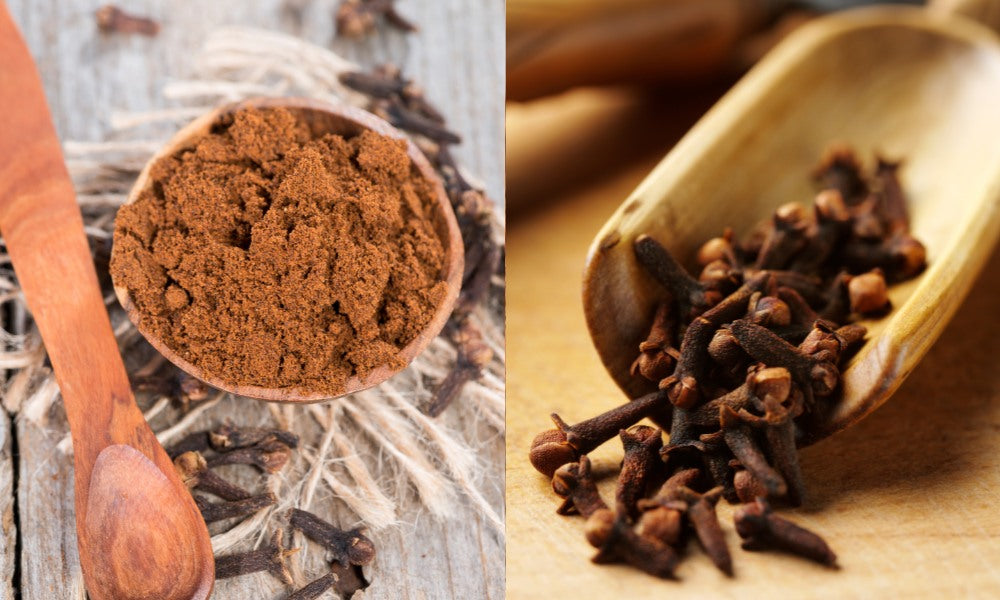
Both whole cloves and ground cloves have their own unique advantages and disadvantages, so it really depends on what you are looking for in terms of flavor and convenience.
Whole cloves have a stronger flavor and aroma compared to ground cloves, as the essential oils are kept intact inside the clove. Whole cloves also have a longer shelf life compared to ground cloves, as they are less susceptible to oxidation and moisture. Whole cloves are also more versatile, as they can be used in pickling, brewing, and cooking. However, whole cloves require more preparation time and effort as they need to be removed from the dish before serving.
On the other hand, ground cloves are more convenient to use and require no preparation time. They are also more evenly distributed throughout the dish, providing a consistent flavor. Ground cloves are ideal for baking, as they mix easily with other dry ingredients. However, ground cloves have a shorter shelf life, as they are more prone to oxidation and moisture.
In summary, if you are looking for a stronger flavor and longer shelf life, whole cloves may be the better choice. However, if you value convenience and consistency in flavor, ground cloves may be the better option. Ultimately, it comes down to personal preference and the specific recipe you are making.
How to grind whole cloves at home for cooking and baking?
Grinding whole cloves at home is a great way to enjoy their fresh, intense flavor and aroma. Here's how to grind whole cloves at home:
Start with whole cloves: Make sure you have high-quality whole cloves that are fresh and aromatic.
Choose a grinder: You can use a mortar and pestle, a spice grinder, or a coffee grinder to grind your whole cloves. If using a coffee grinder, make sure it's a dedicated spice grinder, as coffee beans can leave residual oils and flavors.
Grind the cloves: Add the desired amount of whole cloves to your grinder and grind until you reach the desired texture. If using a mortar and pestle, crush the whole cloves until they are finely ground.
Store the ground cloves: Transfer the ground cloves to an airtight container and store in a cool, dry place away from heat and light.
Tips:
- It's best to grind small batches of whole cloves at a time, as ground cloves lose their flavor and aroma quickly.
- Make sure your grinder is clean and dry before using it.
- If you want a more intense flavor, you can toast the whole cloves in a dry pan over medium heat for a few minutes before grinding.
- Be sure to label your container with the date and type of spice for easy identification.
By following these steps, you can grind whole cloves at home for use in your favorite recipes, adding a fresh burst of flavor and aroma to your dishes.
In conclusion, organic whole cloves are a versatile spice that can be used in a variety of ways to add flavor and health benefits to your meals. From enhancing the taste of baked goods to providing relief from digestive issues and promoting dental health, cloves have been a valuable spice for centuries. By choosing organic whole cloves, you can ensure that you are getting the highest quality and most natural form of this amazing spice. So why not start incorporating organic whole cloves into your diet today and enjoy their rich aromatic flavor and health benefits!
Disclaimer: The views expressed in this article should not be considered as a substitute for a physician's advice. Please consult with your health care professional before buying this product.
Frequently Asked Questions
What Spices or Herbs Are Best for Potatoes
Potatoes are a wonderful side dish to almost any meat. You may be familiar with the many ways you can serve potatoes other than mashed.
These versatile veggies can be used as a side dish in many dishes. You may not know, but many spices and herbs can go well with potatoes.
These delicious recipes can spice up your next potato recipe.
Is garlic used in Thai cooking?
Thai cuisine makes use of garlic. Garlic is often used to make Thai dishes, including salads and soups, stir-fries and curries, as well as sauces and sauces.
In Thailand, garlic is chopped and fried with shallots, ginger, and spices. You can also eat it with sticky rice.
It is common to mince garlic and then mix it with chili paste, salt, fish sauce and lime juice. This mixture is called "Nam Phrik" (namphrik). Nam Phrik is often served alongside grilled chicken, beef, or pork.
What mint is used for Thai food?
Thai cuisine's most used type is lime-leaf, or Mentha cervina.
It has a mild, lemony flavour that adds freshness and zing to dishes. Thai dishes are enhanced with other spices, such as galangal and coriander.
Mint is versatile and can be used both in sweet and savoury recipes. To achieve authentic Thai flavours, it is important to use the right spices, herbs and aromatics.
For extra flavor, make sure to add lime-leaf mint next time you prepare a Thai meal!
Happy cooking!
What Thai spice should I use to cook Thai food in my own kitchen?
To make authentic Thai food at home, you'll need to master five essential spices: black pepper, cayenne, coriander seeds, turmeric, and cinnamon. Each of these ingredients has its distinct flavour profile and plays a vital role in creating delicious dishes.
Cinnamon adds sweetness, while black pepper brings out savoury flavours. Coriander seeds add a spicy kick, while turmeric gives curry powder its signature yellow colour. Cayenne peppers provide heat and cilantro provides freshness. Cinnamon adds complexity and depth to any dish.
Each of these spices is available in your local grocery. If you'd rather buy them online, the following are our recommendations.
What purpose is Thai spice used?
We've all heard the term "Thai spice" thrown around without knowing exactly what it means. When we taste it, our mouths water and we wonder why we aren't eating more.
It isn't just any spice. It's an essential ingredient, which adds depth and flavor to dishes otherwise bland.
There are thousands of Thai recipes, but very few include the authentic flavor. So let's help you figure out how to ensure you're adding these delicious flavors to your meals.
Thais have been using herbs and spices in their cooking since antiquity to add flavor to food. The name Thai originates from the Sanskrit word for "to cook."
Even today, most Thais prefer to eat spicy foods. This preference is often due to the heat in Thailand which makes it difficult for people to stay warm without hot drinks. Thais also consume more chili peppers per capita than Americans and Europeans.
It is a great way to learn more about Thai spices. There will be a large selection of ingredients available including dried chilies (fresh basil leaves), curry paste, ground black pepper, and curry paste.
You may also find whole peppercorns.
Thai cuisine offers two types of spices: dry and moist. Most Thai cuisine uses dry spices, which are ground and pulverized finely.
Dry spices are often added to a dish directly. For example, you can sprinkle ground red pepper onto your chicken soup. To make a paste, wet spices are often mixed with butter or oil.
Wet spices are used in dressings, sauces and marinades. Wet spices are used in many dishes, including fish sauce, oyster, sesame, sesame, sesame oil and curry paste.
Thai recipes can be prepared at home by knowing which spices pair well with what ingredients.
For example, red pepper flakes is recommended for beef. If you use seafood like shrimp, you should use white pepper instead.
Finally, you can always order online if you don't have access to a good quality Asian market. This market has everything you need, including dried chilies as well as exotic herbs and spices.
This Thai recipe will give you a kick next time your stomach gets rumbling.
Almond Flour vs. Almond Meal. What's The Difference?
Almond meal can be substituted for almond flour and is versatile enough to be used in baking, cooking and even making nut-free meals.
Almond flour can also be gluten-containing, which can make it difficult to digest. Gluten-free foods should be avoided if you have celiac Disease or any other digestive condition.
Almond flour isn't considered "superfood", but it is high in healthy fats, fibres, protein, vitamin E, and sodium.
The nutritional benefits of almond meal include magnesium and copper, iron and zinc, manganese as well as potassium and vitamin C.
Almond flour is made of almonds. Almond oil is made from polyunsaturated, monounsaturated, fatty oils. Both can lower LDL cholesterol and increase HDL cholesterol.
Almond flour is also high in antioxidants, such as phenolics, flavonoids and proanthocyanidins. These compounds prevent free radical-induced oxidative stress.
A study published by the Journal of Agricultural Food Chemistry revealed that almond flour had an antioxidant activity equal to that of blueberries.
Almond flour can be purchased with almond milk that has been supplemented with nutrients.
What are the 11 Indian spices?
Indian cuisine has eleven spices: cumin seeds (coriander seeds), mustard seeds (fennel seeds), nigella seeds and black pepper.
These spices are found in nearly every dish. These spices impart a distinct flavor to dishes such as curries (lentils), curries and chutneys. They also add a unique taste to rice, bread, and sweets.
Spices are also important for health reasons. To fight cancer cells, turmeric is an example. Bad breath is protected by cloves. Black pepper helps lower cholesterol levels. Cinnamon lowers blood pressure. And ginger aids digestion.
The spice rack is an excellent kitchen tool as it allows you to experiment and create new combinations of flavors. You can either make your own spice blends or purchase ready-made spices.
Some people prefer not to add any spices to their food. They believe spices only mask natural flavor and do little to enhance them. A pinch of salt or pepper will not harm your dishes.
Most chefs agree spices are essential to culinary art. Many dishes would lack flavor and be boring without them. Try a new recipe next time you feel adventurous.
Statistics
- According to the McCormick Science Institute, indigenous Indian spices were cultivated as early as the 8th century BC in the gardens of Babylon. (spicecravings.com)
- According to Healthline, pink Himalayan salt is estimated to contain up to 84 minerals and trace elements, which gives the salt its special pink color. (spicecravings.com)
- India contributes to 75% of global spice production. (en.wikipedia.org)
External Links
[TAG38]
- Amazon.com. Spend less. Smile more.
- Amazon.com : Morton & Bassett Whole Nutmeg 1.9 Oz : Nutmeg Spices And Herbs : Grocery & Gourmet Food
[TAG41]
[TAG44]
[TAG47]
- Validation and development of Novel Lifestyle Inflammation Scores. - PMC
- PubMed: Molecular mechanisms of curcumins suppressing tumorigenesis, angiogenesis and metastasis. Focus on NF-kB pathway – PubMed
How To
Do You Know How to Make Curry Paste?
Curry paste includes dried chillies (scallions, shallots), galangal root and lemongrass as well as kaffir lime leaves, garlic, shrimp pastes, sugar, salt and sometimes coconut milk. It is used extensively in Thai cuisine.
Curry paste is a very popular condiment in Southeast Asia. It gives many dishes a unique taste, including curries, soups stir-fries, stir-fries and salads.
It's not difficult to make at home! Follow our step-by–step guide below.
Step1 - Prepare Ingredients
- Before starting the recipe, you will need to prepare all ingredients.
- To begin, you will need to peel and chop shallots (about 2 cups). Next, chop galangal root into small pieces (3 inches in length) and place aside.
- Next, cut four garlic cloves into pieces. The lemongrass stems should be roughly 1/2 inch thick.
- You can then crush the red chilli bell peppers into small pieces (about 4 tablespoons), and then you can remove the seeds (optional).
- Next, slice the kaffir lime leaves in thin strips of about 5 inches. Next, remove the white part from the stem and leave it alone.
- Next, drain and wash the shrimp paste (6 ounces), and then coarsely mashing it.
- Finally, measure the sugar and salt.
Step2 - Grind Ingredients
- Grind all ingredients together until smooth.
- The texture should be very similar to peanut butter.
- If you would like to reduce the amount oil in your dish, you could substitute water for some of it.
Step3 - Add Coconut Milk
- Add coconut milk to the mixture, and mix well.
- Slowly add coconut milk to ensure that the paste doesn't become too sticky.
- If you prefer less spicy, add fewer chillies and more galangal root.
- You may prefer it hotter, so add more chilies or less galangalroot. The final product should be tasty to you.
Step4: Serve
- Top your favorite foods with this topping.
- Enjoy!
Resources:
 |
[TAG50]LET ME KNOW IN THE COMMENT SECTION WHAT YOU ALL WOULD LIKE TO SEE ME TALK ABOUT IN OUR NEXT VIDEO | I REALLY APPRECIATE YOU ALL!! THANK YOU FOR 168K |
 |
[TAG51]Better Sleep, More Energy, Higher Consciousness - START YOUR FREE 2-WEEK FLFE TRIAL NOW (no credit card needed) https://tm179.isrefer.com/go/TryFLFEfree/In |
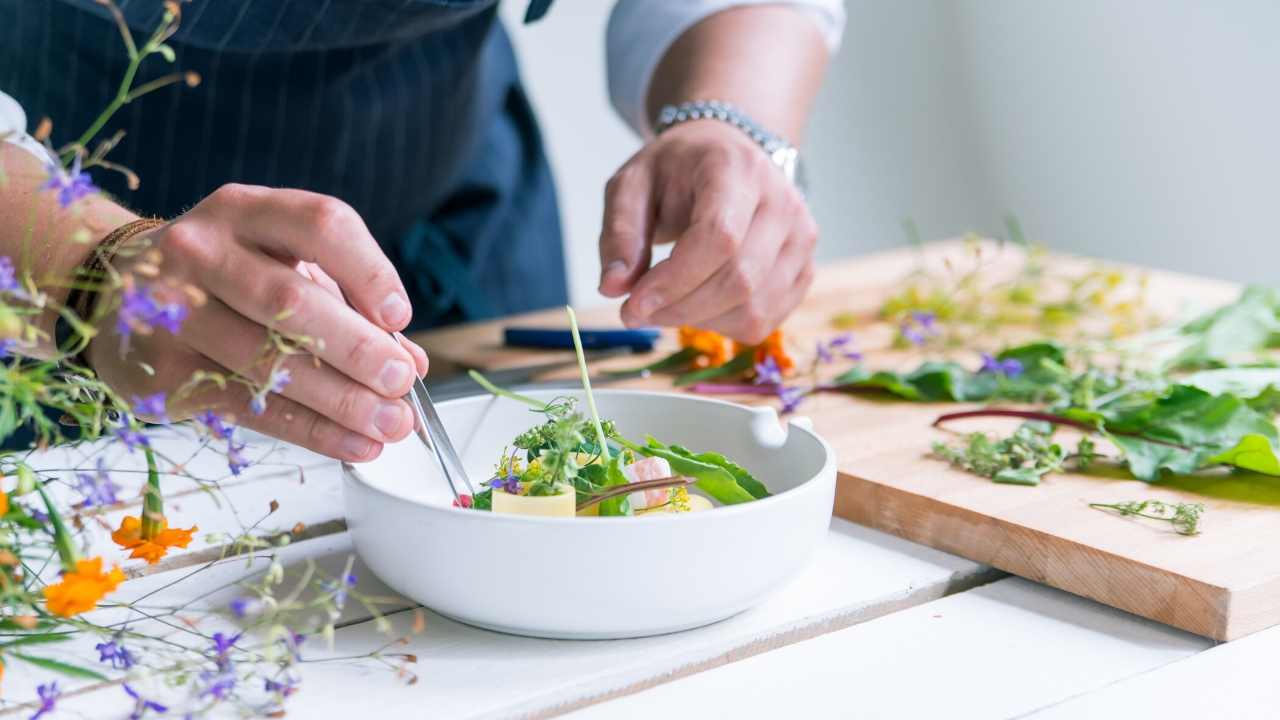 |
[TAG52]My Recipe and Vlog Channel Link:- https://www.youtube.com/channel/UCi5pSJeRu1fbXK4bzIVgSkw Hello Friends, Welcome back to my another video! Today […] |
 |
[TAG53]definition of spices |
 |
[TAG54]CARDAMOM E-AUCTION SPICES BOARD OFFICIAL |
 |
[TAG55]This Is The Situation Room, Kenya's Biggest Conversation! HOSTS: Eric Latiff, Ndu Okoh & CT Muga PRODUCER: Ednah Ombaso EXECUTIVE PRODUCER: Tom |
 |
[TAG56]Subscribe to my channel ▶https://bit.ly/30eqjsu Uncle Rural Gourmet's secret recipe of hot pot, […] |
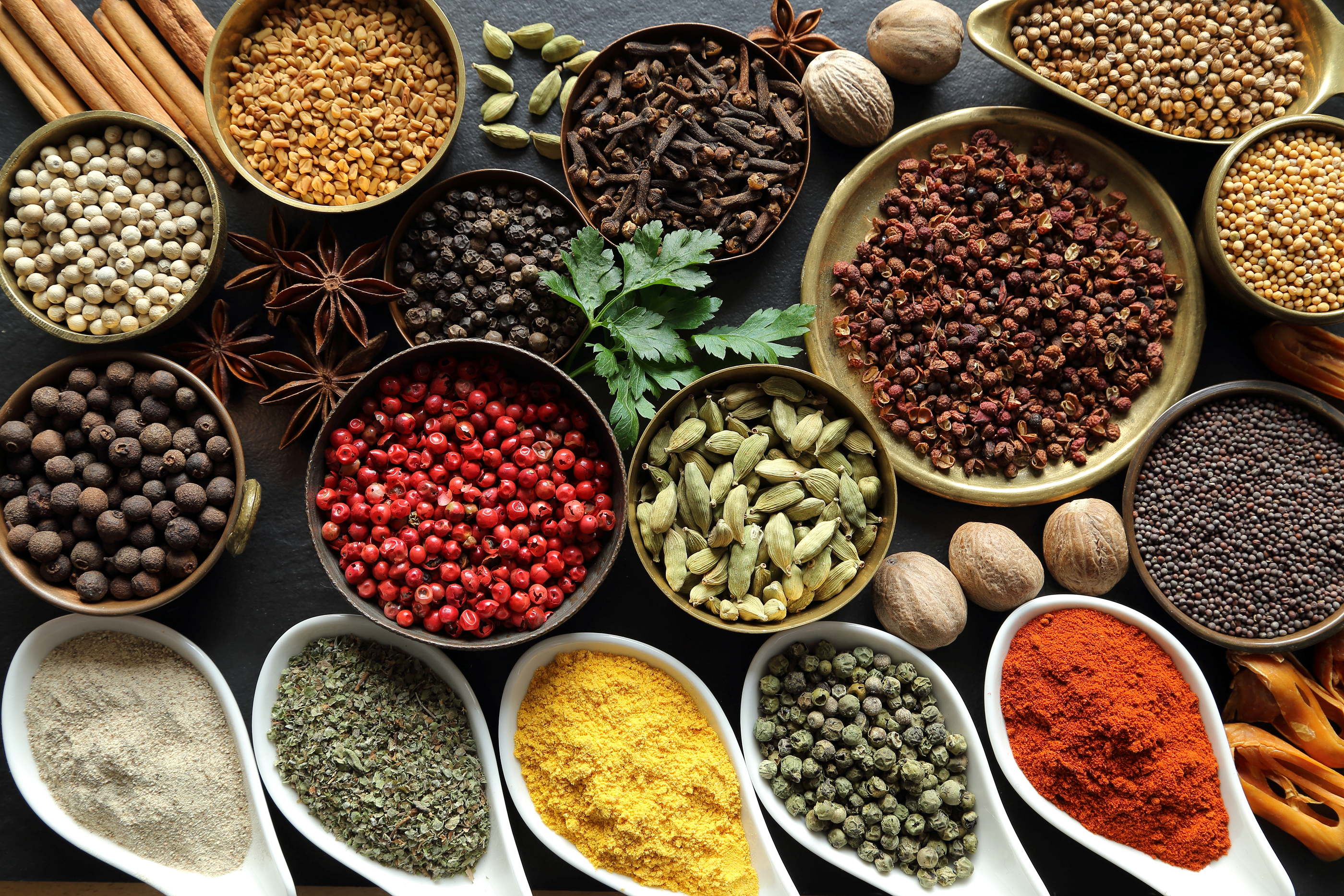 |
[TAG57]Important spices in cooking |
 |
[TAG58]Just a quick live thank you to everyone who has supported this wacky little channel of ours. Join me (and whoever else on the team is still awake) to drink |
 |
[TAG59]India accidentally hired a DEA agent to kill American citizens, federal prosecutors allege. The DOJ filed charges against a man they allege was working with |
 |
[TAG60]https://www.letsdig18.com/ for shirts and more |
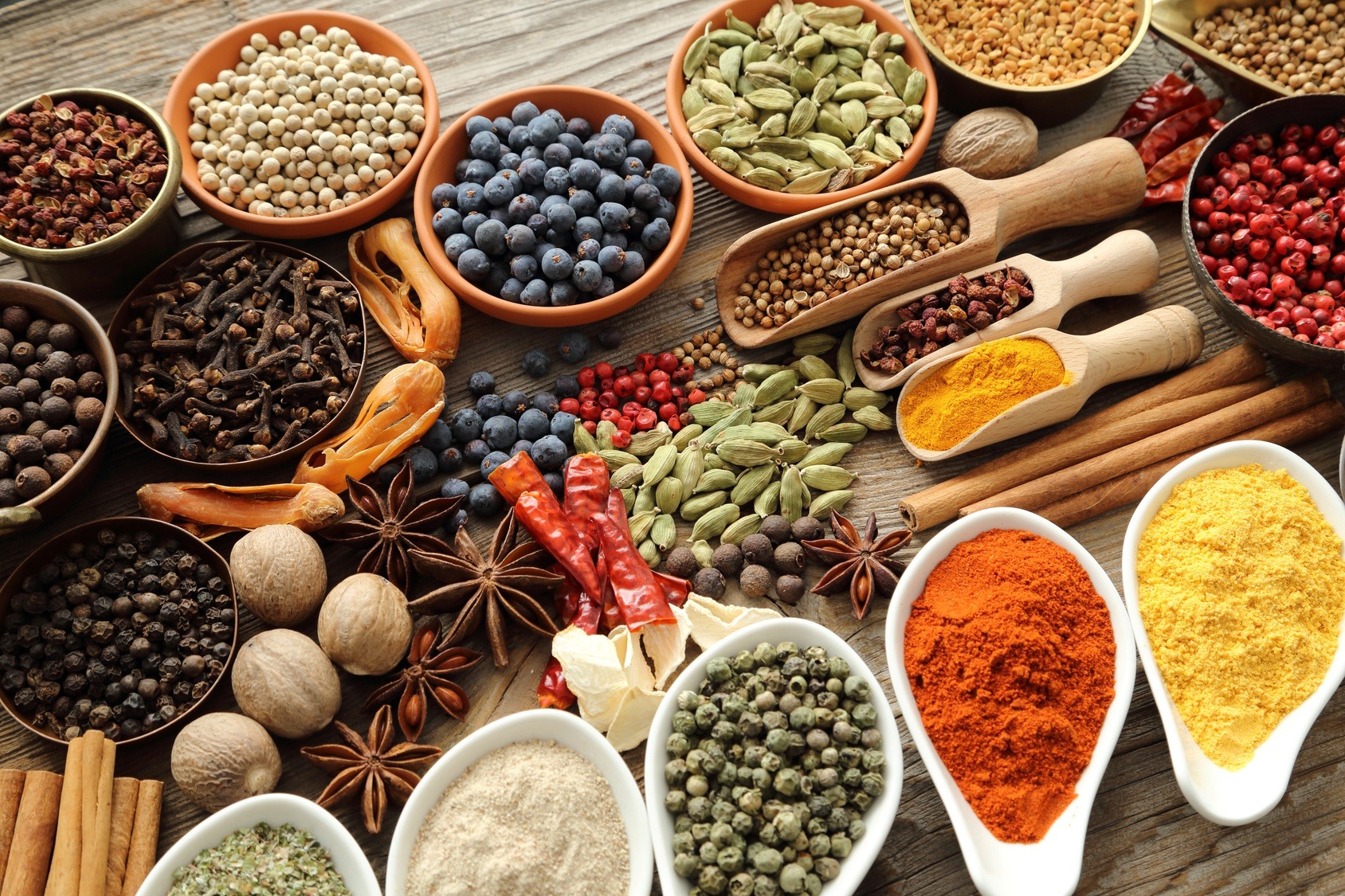 |
[TAG61]Herbs, spice & everything nice, these blog and articles explain the many uses of spices, including spices for weight loss, spices for brewing, and how to store |
 |
[TAG62]something feels VERY WRONG!!! Link for Patreon/Discord community is here. This is to access our private community with weekly live calls and many other |
 |
[TAG63]Pepper imports in August were unusually high at 3,800 tonnesRising imports have kept black pepper prices steady in the domestic market over the past few days, |
 |
[TAG64]Plantation in São Mateus, Espirito SantoBrazil remains stable and firm; expected to slowlymove at upward trend. Still seeing difficulties in securing raw |
/spices-5689d3013df78ccc1533efad.jpg) |
[TAG65]spices | Visit our blog for recipes, cooking tips and techniques as well as our staff's favorite eats and travel adventures. |
 |
[TAG66]Over the past week, black pepper prices have slightly increased by about 1,5% from 73,000 - 74,000.The largest market, China, has resumed purchasing along |
 |
[TAG67]INTERNATIONAL cloves prices have held mostly firm in recent weeks as farmers at origin remain reluctant to lower their pricing ambitions and exporters appear |
 |
[TAG68]For the second year in a row Vietnam became the biggest importer of brazilian black pepper, overcoming traditional destinations like USA and also Germany.USA |
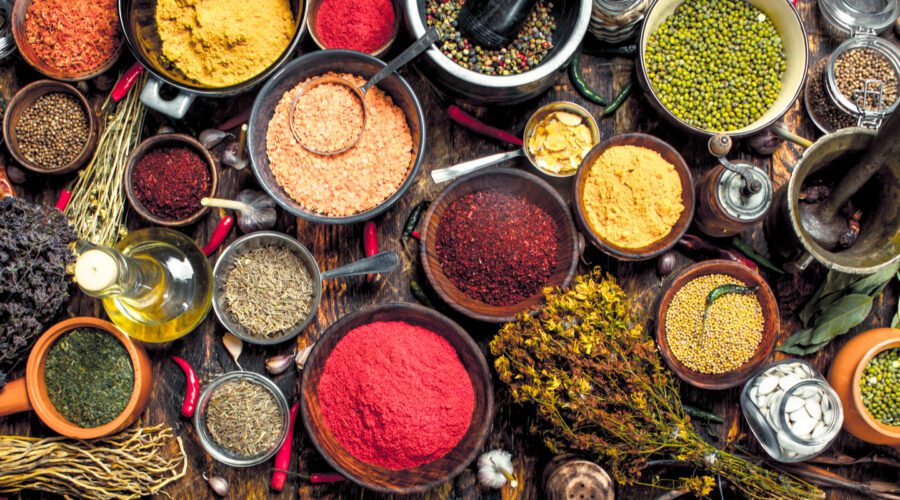 |
[TAG69]This spice blog writes about Indian fenugreek, Canadian coriander, Egyptian dill weed, Syrian Aleppo pepper, Granada nutmeg, & more from around the world. |
 |
[TAG70]August 28, 2023Likely that Vietnam's pepper exports in the first 8 months of the year will reach around 183-185,000 tons. If the forecasted annual pepper |
 |
[TAG71]- In coming time, world pepper market will increase due to reduced supply (low price, low yield due to many old trees, reduced interest in farming due to |
 |
[TAG72]As prices of cardamom rise, India is in danger of losing its export markets to the cheaper Guatemalan cardamom. Even the upcoming festive season may not help |
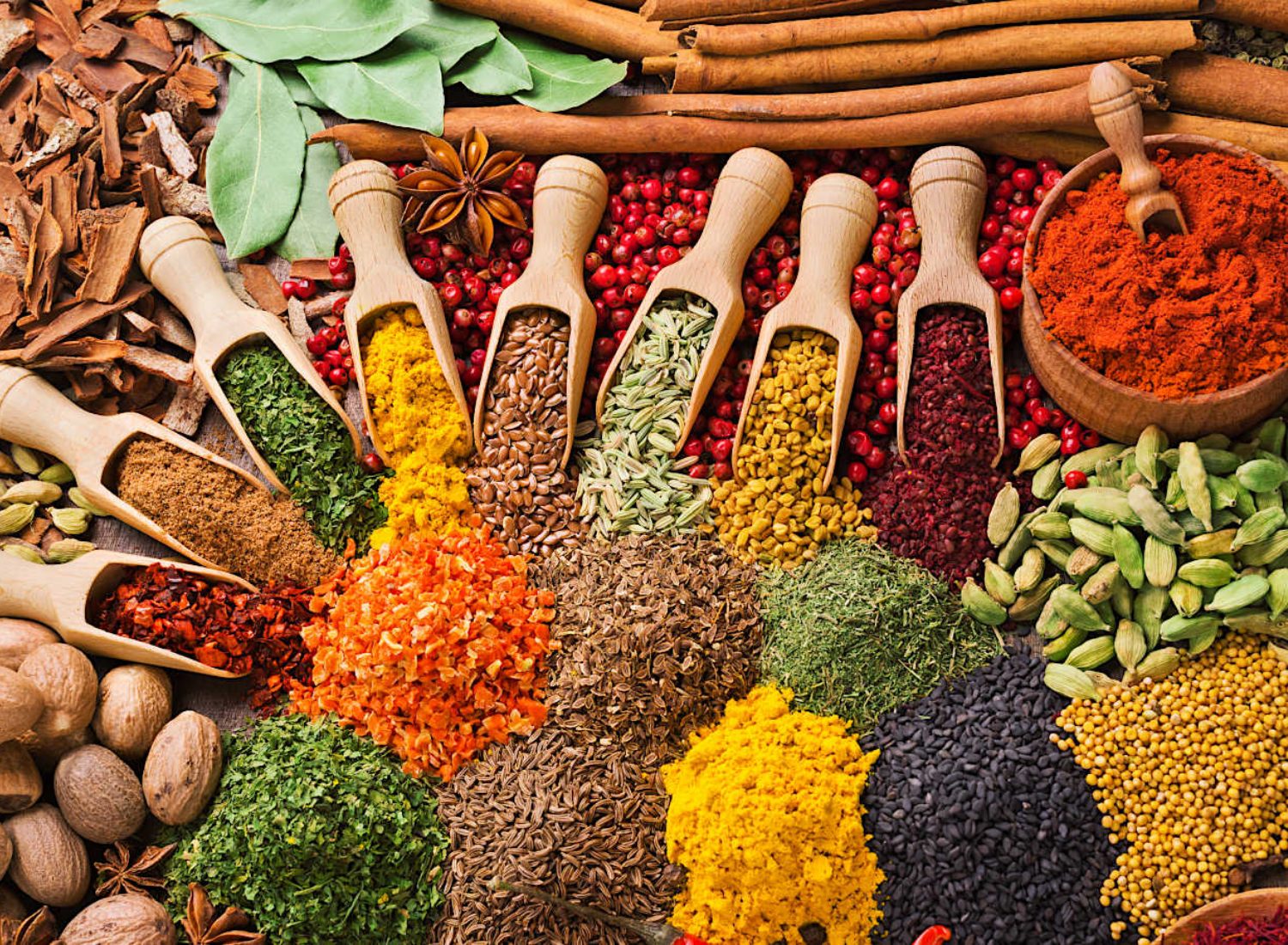 |
[TAG73]World of Spice is your online store for a massive range of High Quality Herbs Spices and Seasonings. Wholesale, Foodservice and Catering High Quality Herbs |
 |
[TAG74]KEY HIGHLIGHTSAugust 11th 2023The pepper market this week showed a mix response with only Malaysian local white pepper price reported with a decrease.The |
 |
[TAG75]As demand outstrips supply and imports become expensive, black pepper prices have risen, prompting growers to resort to hoarding in anticipation of bigger |
.png)





